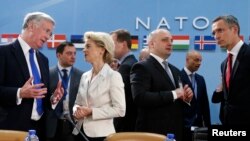NATO Secretary-General Jens Stoltenberg said the alliance was set Thursday to strengthen its defenses near Russia's borders in response to Moscow's "aggressive actions" in Ukraine.
Stoltenberg said defense ministers meeting in the Belgian capital plan to boost the size of the NATO response force from 13,000 to 30,000. They will also likely approve the establishment of a new rapid-response force of about 5,000 troops, he said.
U.S. Defense Secretary Chuck Hagel is attending the Brussels meeting. Vice President Joe Biden also is expected in Brussels later this week, before heading to Munich for security conference where Ukraine is also to be discussed.
NATO defense ministers also will discuss nuclear issues, the conflict in Ukraine, the threat of Russian aggression near NATO’s eastern border, and Georgia’s aspirations to join the 28-member alliance.
This will be the fifth defense ministers meeting for Hagel, who is making his final international trip as U.S. defense secretary.
Time for reflection
Pentagon spokesman Rear Admiral John Kirby said the meeting would offer the secretary time to reflect on NATO’s changes before he leaves office in the coming days.
“This ministerial will be an opportunity for the secretary to offer parting thoughts on the evolution of the alliance over the course of his career -- as a United States senator serving on the Foreign Relations Committee, as the former chairman of the Atlantic Council and, of course, as secretary of defense," Kirby said.
NATO leaders will discuss what the Pentagon calls “continuing Russian provocation in the east.”
Speaking Tuesday at a news conference on Ukraine, Strobe Talbott, president of the Brookings Institution, said Russian action in Ukraine was more than just a provocation.
“The right way to characterize it is an act of war on the part of the Russian Federation," Talbott said. "And in that respect, this is a major threat to the peace of Europe, to the peace of Eurasia and, therefore, a threat to the interests of the United States, and I would say a threat to the chances of a peaceful 21st century.”
President Barack Obama's nominee to be the next defense secretary, Ashton Carter, told lawmakers Wednesday on Capitol Hill that he was inclined to support Ukrainians by providing them with lethal arms. That’s a step NATO allies France and Germany have said they do not support.
A senior Pentagon official said Hagel most likely would discuss the threat from Islamic State terrorists in meetings with some of his European counterparts.
Noticeably absent on the agenda for the first time in 13 years: the war in Afghanistan.
NATO’s combat mission against Taliban fighters ended in December. The NATO-led noncombat train-and-support mission in Afghanistan started on the first of this year.




